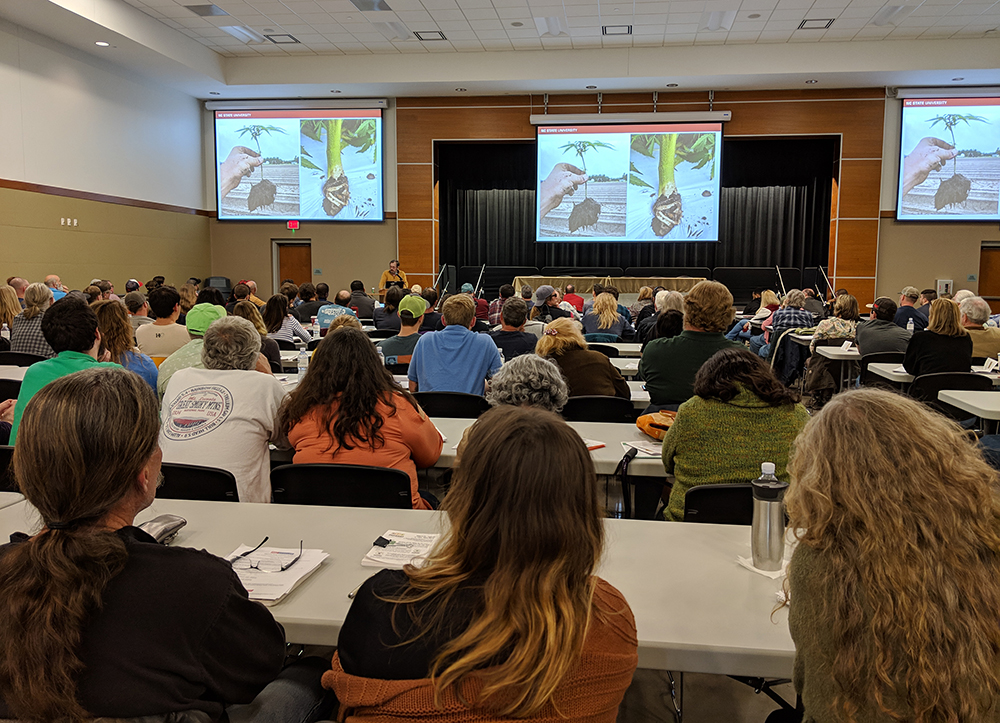Engaging North Carolina
Chatham County

Quick Facts
Students: 336Applicants: 265
Alumni: 1221
Park Scholars: 0
Goodnight Scholars: 2
Caldwell Fellows: 1
Chatham County, founded on Jan. 6, 1771, from land previously part of Orange County, has a current population of 71,472 and a total employment of 14,969 (20.9%). The county seat of this Piedmont county is Pittsboro. Other municipalities include Siler City, Goldston and small parts of Apex, Cary and Chapel Hill.
With predominantly hard red clay soil, the county traditionally has depended more on livestock than on the cultivation of commodity cash crops such as tobacco and cotton. Chatham’s most profitable agricultural product is poultry/eggs, and the largest agricultural product by acreage is forage land (for grain production). The type of livestock produced most by total number is meat-type chickens.
The county’s largest manufacturer is Mountaire Farms, which manufactures poultry products and employs between 250 and 499 people. It is the county’s fourth-largest employer and part of a nationwide network of farms that ranks No. 7 nationally in poultry production.
Central Carolina Community College operates a Chatham County campus in Pittsboro and is part of NC State’s Community College Collaboration (C3) Program, which is a dual-admission partnership between NC State and 10 community college partners near the main Raleigh campus.
NC State is Here
Service NC in Siler City
Caldwell fellows Layne Baker and Katherine Stubbs helped lead Service NC, a new program that brings service learning close to home and back to NC State’s rural roots. Eight Caldwell fellows ran a three-week STEM-themed camp for fourth- and fifth-graders at Siler City Elementary School.
The goal, Baker said in the fall 2018 issue of NC State magazine, is to “show them even though college seems like this very abstract, faraway concept, that it’s not, and that it’s relevant to them now.”
The fellows prepared for their camp by taking field trips to a health center for migrant farmers in the mountains and to rural health clinics on the North Carolina coast. (Read more about the first Service NC project.)
Saving the Historic Courthouse
Pittsboro’s iconic courthouse, at the center of a downtown traffic circle, was restored by Hobbs Architecture, whose father-son namesakes are both graduates of NC State’s College of Design.
Founder Grimsley T. Hobbs Jr. earned a Master of Architecture degree in 1979, and Taylor Hobbs III earned his M.Arch. in 1999.
The famous late Victorian brick courthouse was built in 1881 for $10,666. A one-story addition was built in the 1930s by the Works Progress Administration, and the building underwent extensive renovations in 1959.
On March 24, 2010, while the building was undergoing more renovations, a fire broke out and nearly destroyed the historic structure. However, the outer shell remained, and after three years of redesign, renovation and restoration by Hobbs Architecture, the courthouse reopened to the public, with a history of Chatham County on the first floor and a courtroom on the second.
The courthouse renovation won the 2014 Tower Award and the 2015 Gertrude S. Carraway Order of Merit from Preservation North Carolina.

A student in the College of Natural Resources kayaks the Haw River outside Pittsboro.

A College of Natural Resources student and her kayak on the Haw River outside Pittsboro.
1 of 2
Pride of the Pack
Poe Hall’s Namesake
Editor, publisher and author Clarence Hamilton Poe, namesake of NC State’s Poe Hall, was born on a cotton farm in the Chatham County town of Gulf, about 45 miles west of Raleigh.
Educated in the one-room Rocky Branch School near Sanford, Poe showed an early talent for writing. At the age of 16, he was hired by Col. Leonidas Lafayette Polk, a co-founder of the Watauga Club, to work for the Progressive Farmer, which was the driving force for establishing the state’s first agricultural and mechanical arts school. Poe was named editor of the statewide magazine on July 4, 1899, and he bought the company and publication four years later. It became affectionately known around the state as the Poe-gressive Farmer.
Though he was a man of simple means, riding his horse to the office every day, he was well-recognized for his worldwide contributions to agriculture. He was a member of the State Board of Agriculture, served as the longtime president of the Watauga Club and was elected to the North Carolina Agriculture Hall of Fame. A frequent honoree by southern colleges, Poe was awarded an honorary degree in agricultural education from NC State in 1951, one of five honorary doctorates he received in his lifetime.
The seven-story Poe Hall, built from concrete and precast stone panels, was dedicated in his memory in 1971. (Read more about Clarence Hamilton Poe.)
First Black Extension Agent
North Carolina’s first African American agricultural extension agent, Neil Bailey Alexander, graduated from NC State’s land-grant partner, North Carolina A&T State University in Greensboro.
Bailey was hired on Nov. 1, 1910, as a “U.S. farm demonstrator” or agricultural state agent and worked in Guilford, Randolph and Rockingham Counties until Dec. 31, 1915. Any agent who held the position was required to have his own horse and buggy for travel.
Noted for his promotion of corn production, a prominent project in the early part of the 20th century, Bailey frequently wrote about this and other subjects. Bailey’s office was located on the campus of A&T, while he and his family resided at different times in Pittsboro and in Randolph County. (Read more about Neil Bailey Alexander.)